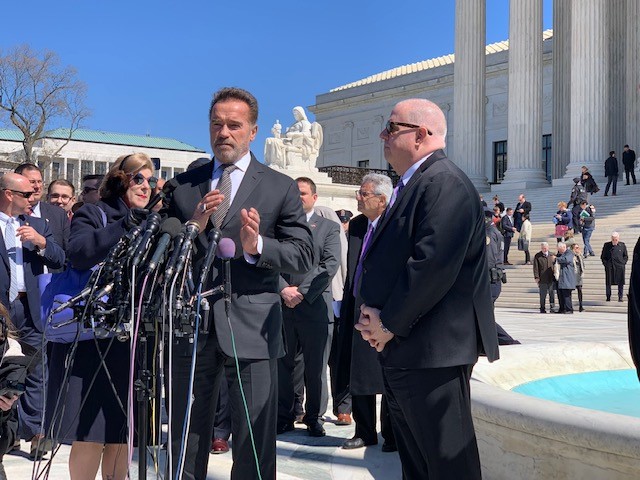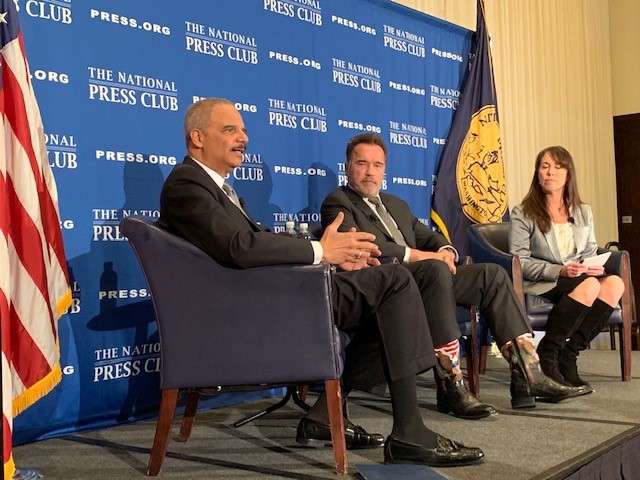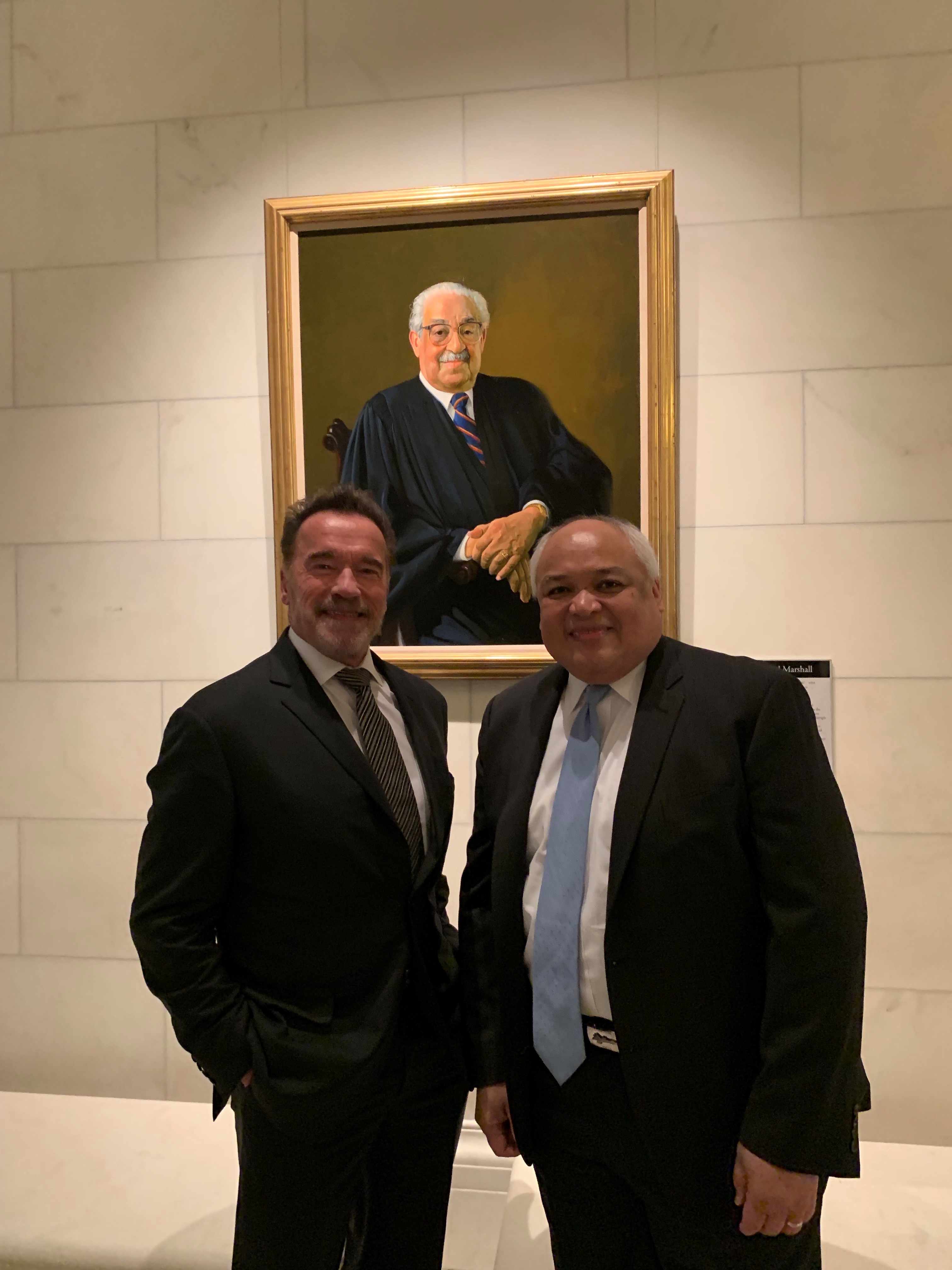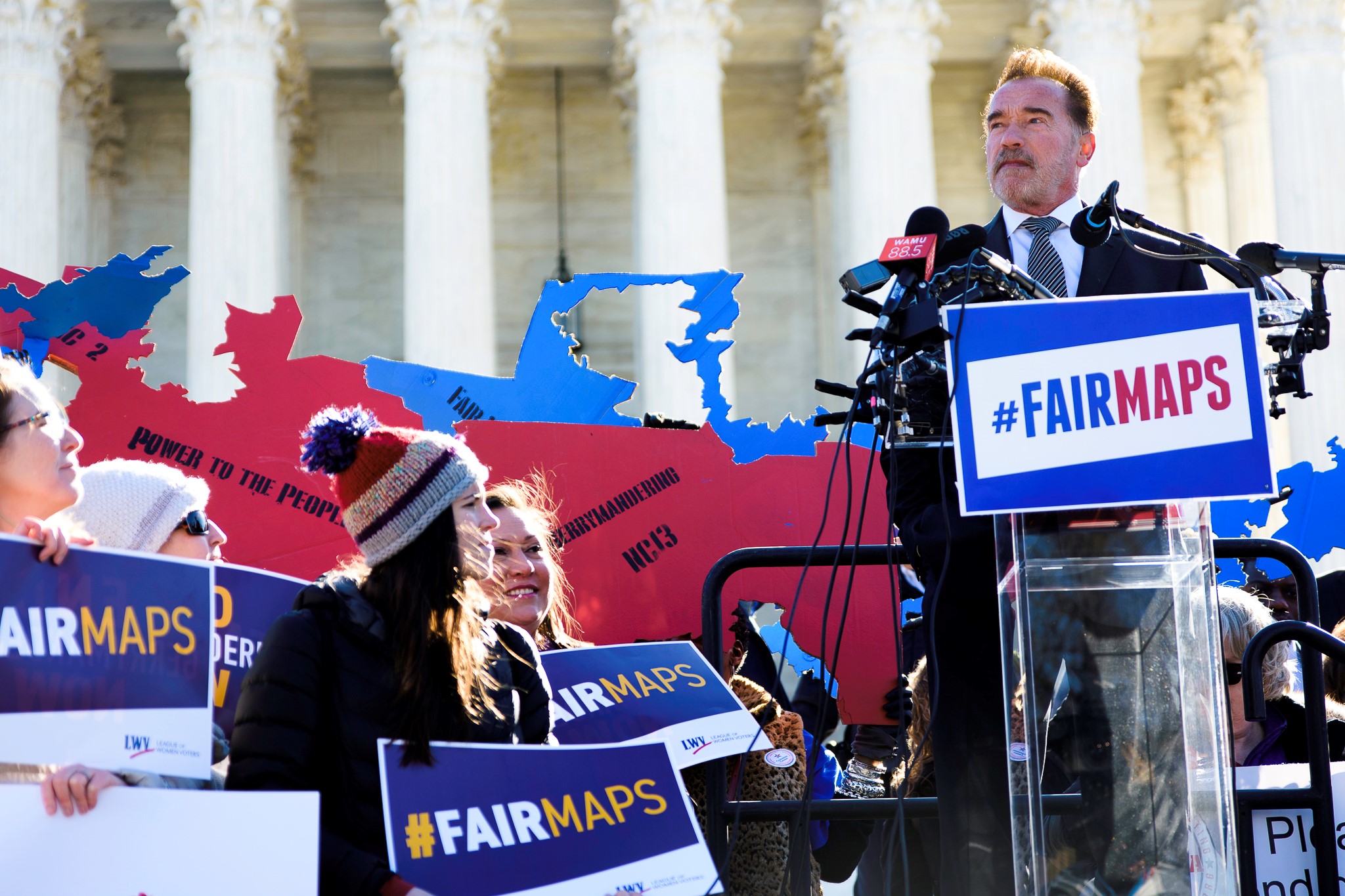On Tuesday, March 26 the Supreme Court of the United States heard oral arguments in two cases, Rucho v. Common Cause and Lamone v. Benishek. Before and after the oral arguments, Governor Schwarzenegger took part in press events on the steps of the iconic building. Maryland Governor Larry Hogan, California Common Cause senior leaders Karen Hobert Flynn and Kathay Feng, Representative Alan Lowenthal, and other good government reformers also took part in a Fair Maps rally. Speaking at the rally, Governor Schwarzenegger stated “it is a national scandal with what is going on with the gerrymandering and the way our politicians draw the district lines. Both parties are doing it. Democrats are gerrymandering, Republicans are gerrymandering. It is a real disservice to the people. It is not a representative government, but a mis-representative government.”
In Rucho, the Court considered the constitutionality of the North Carolina redistricting plan. In the North Carolina map, even though 49% of voters chose Democrats, only 3 of the 13 seats went to Democrats. Republicans won 10 other seats due to a gerrymander drawn by the GOP-controlled legislature, and a GOP state legislator admitted that the maps were drawn “to give a partisan advantage.” In Lamone, the Supreme Court reviewed the case of the Maryland congressional redistricting map. In Maryland, the Democratic-controlled state legislature drew a Democratic gerrymander. Even though one-third of Maryland’s voters chose Republicans in 2018, only 1 of 8 districts (12.5%) elected a Republican House member.
Governor Schwarzenegger and Governor Hogan submitted an amicus brief in these cases. The governors argued that both the Maryland and North Carolina redistricting plans were unconstitutional; as gerrymandering reduces legislator performance, makes governance worse, and harms voters who are independents or in the political party who is on the wrong side of the gerrymander. In the brief, Schwarzenegger and Hogan pointed to USC Schwarzenegger Institute research conducted by Academic Director Christian Grose showing that partisan polarization was reduced after California enacted its Citizens Redistricting Commission. The justices referenced the amicus briefs during the oral arguments, suggesting they were influential in developing their line of questioning.
Prior to the oral arguments, Governor Schwarzenegger met with Thurgood Marshall, Jr. Marshall’s father, Justice Thurgood Marshall, joined the majority opinion in the Court’s 1986 Davis v. Bandemer case that first stated that the Supreme Court could in fact rule on the unconstitutionality of partisan gerrymandering.
The justices’ questions during oral arguments provided some guidance on how the case may be decided. More reform-oriented justices like Stephen Breyer joined with new conservative Justice Brett Kavanaugh in asking questions about establishing a standard for partisan gerrymandering, particularly in extreme cases where the party wins significantly more seats than votes. Kavanaugh, who lives in Maryland, had many questions about the Democratic gerrymander in that state. In addition, Justice Ruth Bader Ginsburg, during questioning of counsel, defended the right of the people of California and other states to use referenda to create independent redistricting commissions such as the one passed in California under Governor Schwarzenegger’s leadership.
After the Supreme Court oral arguments, Governor Schwarzenegger appeared with former Attorney General Eric Holder, who currently heads the National Democratic Redistricting Committee. Alison Fitzgerald Kodjak, National Press Club president and NPR correspondent, asked questions about their partnership to fight for fair districts. Schwarzenegger and Holder both endorsed redistricting reform; and Governor Schwarzenegger asked Holder to travel with him to North Carolina and Maryland to continue the fight for fair districts. Schwarzenegger talked about why redistricting reform is so important to him: “I got involved in it because as an immigrant I promised myself….that I am going to do everything I can to keep it [the United States] the #1 country in the world….[So] I am very…focused on saying Hasta La Vista to gerrymandering.” Attorney General Eric Holder responded by calling Schwarzenegger a “gutsy governor who is willing to lead” on redistricting reform and the environment. The entire National Press Club event can be viewed here.
At the conclusion of the conversation Governor Schwarzenegger and Attorney General Holder signed Common Cause’s End Gerrymandering Pledge that supports fair redistricting reform that is transparent, nondiscriminatory, and politically impartial.
“The fight to end gerrymandering and support fair maps should not be a partisan issue,” said Holder. “The American people deserve fair elections decided by who has the best ideas, not which party was in charge of drawing the lines. It’s time to end the era of politicians choosing their voters and give that power back to the people where it belongs.”
“We pledge to do everything we can, to fight in every state, to leave no stone unturned in the fight against the 200 year old scam of gerrymandering,” added Schwarzenegger. “The first three words of the Constitution are ‘We the people’ – not ‘we the politicians’ and it is time to give the people fair maps and the representation they deserve.”
The End Gerrymandering Pledge was developed by Common Cause to get prominent national leaders — including elected officials in every state and of all political persuasions — to commit to advancing non-partisan, non-discriminatory, and non-secretive redistricting across the United States. It targets state legislators who control map-drawing in most states, incumbent members of Congress who benefit from safe seats drawn by partisan map-makers and citizens who ultimately will hold their elected officials accountable for reforms.
“As 2020 rapidly approaches, redistricting reform is more critical than ever,” said Kathay Feng, national redistricting director for Common Cause. “We are working to change laws, create technology, and engage citizens to draw districts that fairly represent a state's communities and changing demographics.”
Schwarzenegger’s Washington visit made a significant policy impact, and continues the fight against gerrymandering that began with the passage of the California Citizens Redistricting Commission and continues with the Schwarzenegger Institute’s Fair Maps Incubator. The Institute will continue its focus on redistricting and political reform.




